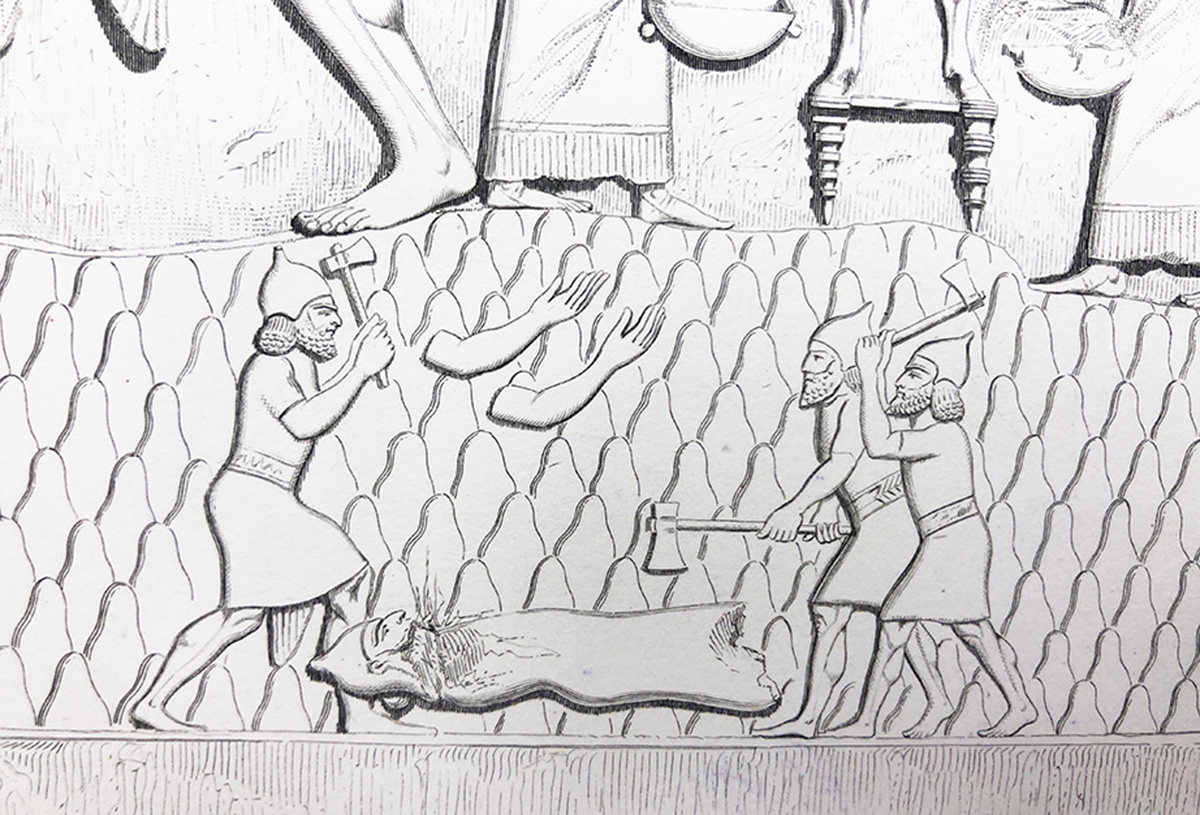Discussion / “The Idols of ISIS,” with Aaron Tugendhaft, Michael Rakowitz, Rijin Sahakian, and Wendy M. K. Shaw
Date: Sunday, 1 November 2020, 12–2 Eastern Standard Time / 6–8 pm Central European Time
Venue: Online via Zoom. Please register here. Note that the Zoom link for the event itself will be emailed to all registered guests on 30 October.
Organized by Cabinet magazine
Co-presented with the Vera List Center for Art and Politics

Aaron Tugendhaft’s new book, The Idols of ISIS (University of Chicago Press), begins with the uncanny resemblance between two images from northern Iraq: an eight-century BC palace relief of three Assyrian soldiers smashing the sculpture of a king, and a viral video from 2015 depicting Islamic State fighters doing the same thing in the Mosul Museum. Why this persistent drive to destroy images? Why make other images showing their destruction?
Tugendhaft’s book addresses these fundamental questions about the role of images in politics. Drawing connections across millennia, from ancient Assyrian art through medieval Islamic philosophy to first-person shooter video games, The Idols of ISIS provides a richly layered reflection on the politics of iconoclasm. With relevance well beyond the particularity of the Islamic State’s caliphate, The Idols of ISIS reveals why false images are necessary for establishing pluralistic politics and thereby forces us to reconsider the deep-seated impulse to rid the world of idols.
Tugendhaft will be joined by artist Michael Rakowitz, writer Rijin Sahakian, and scholar Wendy M. K. Shaw to discuss the political power of images, the persistent drive to destroy them, and why we regularly make new ones depicting that destruction.
About the Participants
Aaron Tugendhaft was trained in art history, religious studies, and political philosophy at the University of Chicago, New York University, the Hebrew University of Jerusalem, and the Sorbonne. In addition to The Idols of ISIS, he is the author of Baal and the Politics of Poetry (Routledge, 2018) and co-editor of Idol Anxiety (Stanford University Press, 2011). In 2013, he received the Jonas C. Greenfield Prize for Younger Semitists from the American Oriental Society. His essay “Archaeology and Jihad” was published by Cabinet in 2019. He teaches the humanities at Bard College Berlin.
Michael Rakowitz is an artist based in Chicago.
Rijin Sahakian is a writer and the former director of Sada, a nonprofit for arts education, advocacy, and production programs serving Baghdad-based artists, which she founded while a Fulbright Scholar in Amman, Jordan. She has conducted seminars and programs at arts and education spaces in the United States and abroad, including at the City of Los Angeles Department of Cultural Affairs, where she guest-curated the exhibition “Shangri La: Imagined Cities.” She has also served as visiting professor at the California Institute of the Arts. Sahakian has contributed writing to a range of artist projects and publications, including Al-Mutanabbi Street Starts Here, Hyperallergic, Warscapes, e-flux journal, and n+1. She holds an MA in Contemporary Art and Politics from New York University.
Wendy M. K. Shaw is professor of the art history of Islamic cultures at the Freie Universität, Berlin. Her work focuses on postcolonial art historiography and decolonial art history of the Islamic world and the modern Middle East. She is author of Possessors and Possessed: Museums, Archaeology, and the Visualization of History in the Late Ottoman Empire (University of California Press, 2003), Ottoman Painting: Reflections of Western Art from the Ottoman Empire to the Turkish Republic (I.B. Tauris, 2011), and Loving Writing: Techniques of Fact-based Communication at the University and Beyond (Routledge, forthcoming). Her What Is “Islamic” Art: Between Religion and Perception (Cambridge University Press, 2019) was the winner of “Honorable Mention” for the 2020 Albert Hourani Book Award of the Middle East Studies Association.